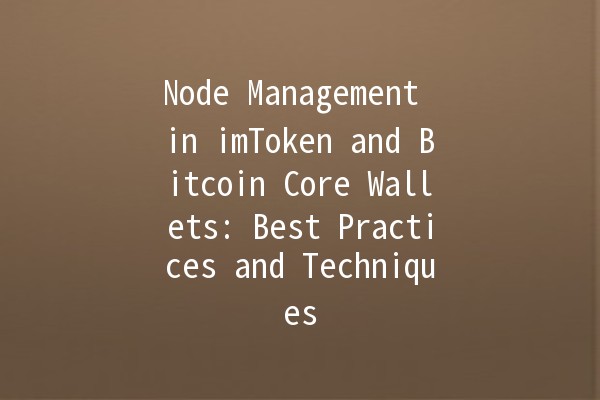In the everevolving cryptocurrency landscape, managing nodes can be a daunting task, especially for users navigating different wallets. Among these, the imToken and Bitcoin Core wallets stand out as popular choices for secure and efficient cryptocurrency management. This article aims to unravel the complexities of node management in both wallets, providing practical productivityenhancing tips for users to optimize their experience.
A node is a crucial component of a blockchain network. It is any device that connects to the blockchain and can validate transactions, store data, and relay information to other nodes. Nodes play a fundamental role in maintaining the integrity and security of the blockchain.

imToken is a mobile wallet known for its userfriendly interface and multichain support. It allows users to manage various cryptocurrencies, not just Bitcoin. It utilizes a light node architecture, enabling efficient performance on mobile devices while offloading much of the data processing to full nodes in the network.
Bitcoin Core is the original wallet software for Bitcoin. It functions as a full node, providing users with the ability to validate transactions and maintain the blockchain. While it offers enhanced security and privacy, it requires considerable system resources.
Explanation: Keeping your wallet software updated is one of the simplest yet most effective ways to enhance node performance and security.
Application Example: If you’re using imToken, enable automatic updates in the app settings to ensure you always run the latest version. For Bitcoin Core users, regularly check the official website or use the builtin update feature to maintain security patches and performance improvements.
Explanation: Adjusting network settings can optimize your node’s performance, improve synchronization times, and enhance transaction processing.
Application Example: In Bitcoin Core, you can modify the connection settings to limit the number of connections to nodes or adjust bandwidth usage under the settings menu. For imToken, ensure that your device maintains a stable internet connection, preferably on WiFi, to avoid frequent disconnections that can slow down your node.
Explanation: Seed phrases are critical for wallet recovery. Using them wisely can save time and prevent potential losses.
Application Example: Store your seed phrases in a secure location, preferably offline. Both wallets provide options to back up these phrases securely. If you ever need to recover your wallet, having this access will enable quicker restoration of your funds without tedious processes.
Explanation: Engaging with user communities can provide valuable insights and tips on improving node management and troubleshooting.
Application Example: Join forums or social media groups dedicated to imToken and Bitcoin Core users. These platforms can offer advice on common issues, optimizations, and the latest news affecting node operation. This peer support can greatly enhance your management efficiency.
Explanation: Monitoring your node’s performance through analytics can help identify bottlenecks or potential issues.
Application Example: Use tools like Block Explorer or wallet analytics functions within Bitcoin Core to keep track of transaction statuses and node health. For imToken, periodically check the app’s performance metrics to ensure everything operates smoothly and efficiently.
Running a full node in Bitcoin Core allows users to validate their transactions independently and contribute to the network’s security. It enhances privacy, as users do not need to rely on external services for transaction verification.
To switch from imToken to Bitcoin Core, first back up your wallets using their respective seed phrases. After this, download the Bitcoin Core software and restore your wallet using the seed phrase from imToken. However, please note that this action only transfers funds and does not move the node setup directly.
Yes, you can run both wallets simultaneously. However, you must ensure your device has sufficient resources (CPU, RAM) to support both applications without compromising performance.
If your node goes offline, your wallet may lose the ability to broadcast transactions until it reconnects. Full nodes like Bitcoin Core may take longer to sync upon reconnection, while light nodes like imToken will generally reconnect more quickly by querying other nodes.
Running a full node comes with risks, such as exposing your IP address to other users on the network. To mitigate these risks, consider using a VPN or configuring your node to use Tor for added privacy when running Bitcoin Core.
The storage requirements for Bitcoin Core can be significant, as the entire Bitcoin blockchain must be downloaded. As of the last update, it requires over 400 GB of disk space. Regularly monitor your storage and consider upgrading your hard drive or using external storage solutions.
, managing nodes in imToken and Bitcoin Core wallets requires a proactive approach. Through regular updates, network optimization, and community engagement, users can maximize their wallet performance, enhancing their cryptocurrency management experience. By implementing the techniques outlined above, users can not only secure their assets but also become more effective in navigating the complex world of cryptocurrency.